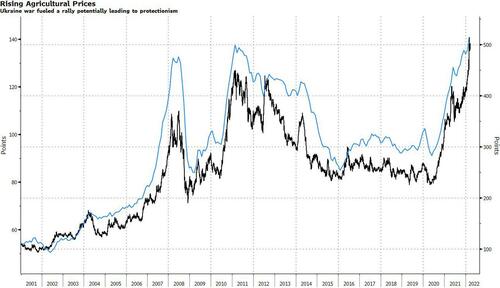Next Inflation Shock Comes From Resource Nationalism
By Valerie Cerasuolo, Bloomberg Markets Live commentator and reporter
First there was supply-chain disruption brought on by the coronavirus, then war in Ukraine further rocked commodity markets. The next bout of inflation via raw material prices will be brought on by resource nationalism.
While the cost pressures brought on by the difficulty in moving goods in a world in lockdown are fading, other factors are more enduring.
For instance, the post-Cold War spread of e-commerce allowed companies to treat the world as both factory floor and marketplace. Comparative advantage, strategic partnerships and the success of globalization led to growth and prosperity. Russia’s invasion of Ukraine jarred that dynamic and has set in motion a series of quasi-isolationist responses.
What started as economic sanctions on Russia has tipped the balance: we are no longer in a uni-polar world. We have entered into a multi-polar one where traditional economic superpowers can no longer call the shots. Service-driven economies are price takers and have far less leverage over those producing raw materials.
The geopolitical landscape has changed and economic incentives along with it. The growing emergency that sanctions on Russia have caused over energy supply security will be inflationary for years to come. Nowhere is this more evident than in Europe, given its direct exposure to Russia energy, with individual countries prioritizing domestic energy security as a first port of call.
The European Union entered an era of energy inflation given its commitment to address climate change and fossil fuel dependence by “greening” the economy. Such aims create price pressure, and has led to discussion at the European Central Bank on whether its inflation target should be adjusted.
Russia and Ukraine are two of the globe’s top grain producers. Conflict has triggered panic and price squeezes on everything from fertilizer to cooking oil, and has also led nations to rethink their approach to national stockpiling.
Energy security pulls into focus security of other commodities. The list of countries restricting agriculture exports is growing. It includes Indonesia, Hungary, Argentina, and Turkey. China’s begun stockpiling corn and soybeans while sources mention state refiners are considering pausing exports of gasoline and diesel in April.
Effectively, every resource a nation produces has the potential to become a bargaining chip. There is a price to meet security of resources. As more economies step away from globalization that cost will get steeper as isolationist tendencies produce greater trade frictions.
The process is unlikely to extend to a fear-driven mania. Consider it more of a purposeful step-change in both governments’ and corporations’ mental accounting and future planning, increasing both cost and scarcity to ensure resource security.
Nations cannot adopt a complete isolationist approach — it’s impossible to fully unwind decades of economic integration. However, lack of supply reliability results in additional inflation premia, regardless of the war’s outcome or duration.
Tyler Durden
Tue, 03/22/2022 – 20:05

